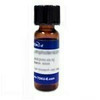Pepstatin A, a pentapeptide isolated from Streptomyces sp. is a strong inhibitor of aspartyl proteases such as pepsin, cathepsin D, and renin. Pepstatin is active against HIV-1 and Plasmodium falciparum. HIV-infected H9 cells incubated with pepstatin A at 10-4M for 2, 4 or 10 days had significantly reduced HIV core antigen (p24) and no infectious HIV. Pepstatin A exerts its antimalarial activity via P. falciparum plasmepsin II binding sites. Pepstatin A suppresses NF-κB ligand (RANKL)-induced osteoclast differentiation and decreases the expression of nuclear factor of activated T cells c1 (NFATc1), suggesting that suppresses the differentiation of osteoclasts through the blockade of ERK signaling and the inhibition of NFATc1 expression.
| Molecular Formula | C34H63N5O9 |
| References |
Andrews KT et al (2006) Potencies of human immunodeficiency virus protease inhibitors in vitro against Plasmodium falciparum and in vivo against murine malaria. Antimicrob. Agents Chemother. 50:639 Umezawa H et al (1970) Pepstatin, a new pepsin inhibitor produced by Actinomycetes. J Antibiot. XXIII, 259 von der Helm K et al (1989) Inhibition of HIV replication in cell culture by the specific aspartic protease inhibitor pepstatin A. FEBS Lett. 247:349
|


